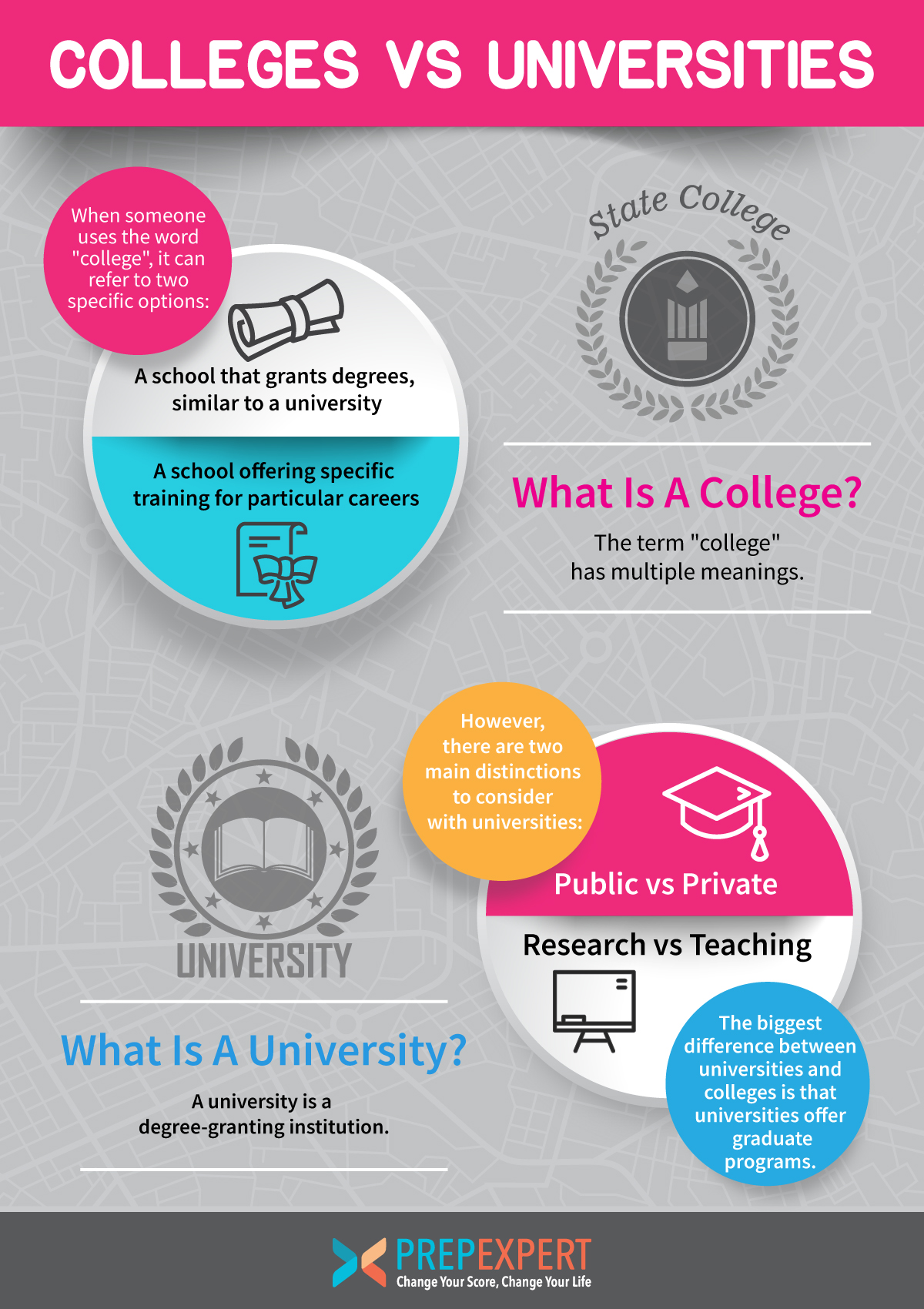Colleges Vs Universities
Ask yourself this question: do you actually know what a ‘college’ is? For that matter, do you know what defines a ‘university’? Believe it or not, there are actual differences between the two types of schools. Thankfully, it takes only a few minutes to clear up the differences between colleges vs universities.
Familiarize yourself with the simple yet key differences between colleges vs universities.
Learn how to prepare for standardized tests with our year-round SAT prep and ACT prep courses today.
What Is A College?
The term “college” has multiple meanings.
When someone uses the word “college”, it can refer to two specific options:
- A school that grants degrees, similar to a university
- A school offering specific training for particular careers
Here are the three main types of colleges:
Liberal Arts Colleges
These schools focus on well-roundedness.
Liberal arts colleges are normally four-year institutions primarily focused on undergraduate education. Liberal arts institutions usually lack graduate programs and major research initiatives.
Instead, they focus their staff and resources on providing students with a well-rounded education emphasizing the following traits:
- Problem-solving
- Critical thinking
- Communication skills
If you’re interested in pursuing a degree that’s not heavily research-based, or general in nature, then a liberal arts college will fit those needs.
Community Colleges
These schools are a great middle-ground option.
Community colleges, sometimes known as junior colleges, focus primarily on associate degree programs. These programs are normally two years long, rather than a standard four-year bachelor’s program.
Community colleges tend to be smaller in size, but offering greater interaction with faculty. More importantly, many students will complete general prerequisites at community college and then transfer to a traditional four-year institution.
Career Colleges
These institutions provide specific training for vocations.
Career colleges go by a variety of names:
- Technical schools
- Trade schools
- Vocational schools
No matter the name, their goal is the same. They provide job-specific training for a variety of vocations. If you already know exactly what trade you’ll pursue and want to get into the workforce faster, then a career college is for you.
Typically, these schools offer shorter-term degrees:
- Certifications
- Diplomas
- Associates degrees
Some schools can offer regular bachelor’s and master’s degree programs, but they are typically the institution’s focus.
What Is A University?
A university is a degree-granting institution.
The biggest difference between universities and colleges is that universities offer graduate programs. Those graduate programs can lead to either master’s or doctoral degrees, depending on your interest and commitment.
Universities are also larger than colleges and offer a wider course variety. Where students often get confused is a university can contain multiple colleges and schools. For example, Harvard College is a liberal arts college at Harvard University.
However, there are two main distinctions to consider with universities:
- Public vs Private
- Research vs Teaching
Public vs Private
The distinction refers to university funding.
Public universities receive partial funding from state and local government budgets. Every state contains at least one public university.
An incentive they all provide in-state students is lower tuition rates versus out-of-state students. The rationale here is that in-state student families already support the university through their tax dollars.
Private universities do not receive any government funds. They operate through the following revenue sources:
- Tuition fees
- Endowments
- Private donations
Their tuition and associated fees are higher than public universities, but many of them also offer significant financial aid money to help offset expenses.
Research vs Teaching
How faculty spends their time is the main issue here.
At every university, faculty must split time between teaching courses and conducting research. How those priorities are balanced though, affects the university overall.
Research universities are generally large institutions that offer a wide variety of programs at undergraduate and graduate levels. Their research focus means that both on-campus facilities and faculty members are high-level.
However, undergraduate classes at these schools are conducted more by graduate students than the professors themselves. If, for example, you take a science lab course, the lecture may be conducted by the professor, but the lab work is taught by a graduate student.
Teaching universities, on the other hand, are more focused on imparting information to students than conducting high-level research.
Professors here teach a full course-load of classes and focus more on students than research and article publishing. The facilities may not be as impressive, but the quality of personal instruction is higher.
For more test strategy, college admissions, and scholarship application tips sign up for our FREE class happening right now!
Colleges Vs Universities FAQ
What are the differences between colleges and universities?
The biggest difference between universities and colleges is that universities offer graduate programs. Those graduate programs can lead to either master’s or doctoral degrees, depending on your interest and commitment. Universities are also larger than colleges and offer a wider course variety. Where students often get confused is a university can contain multiple colleges and schools.
What exactly is a college?
When someone uses the word ‘college’, it can refer to two specific options – A school that grants degrees, similar to a university, or A school offering specific training for particular careers.
What are the different kinds of colleges?
The three main college types are – liberal arts colleges, community colleges, and career colleges.
What is a university?
A university is a degree-granting institution. Plain and simple.
